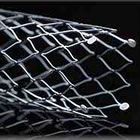|
Results: 90% Did Not Require Reintervention It is estimated that peripheral artery disease (PAD) of the lower extremities, including the SFA, affects approximately 8 million people in the United States each year, although many patients are unaware of their condition or its consequences. PAD patients have a two-to-six-fold increase in cardiovascular mortality and a significantly increased risk of amputation, disability and diminished quality of life. The principal investigators of the Complete SE SFA study are Dr. John R. Laird. Medical Director of of UC Davis Vascular Center in the United States and Prof. Dr. Dierk Scheinert of the University of Leipzig Heart Center in Germany. The following comments are from Medtronic's press release.
"The strong performance of the Complete SE vascular stent in this rigorously conducted clinical trial is encouraging," said Dr. Laird, who presented the results at this year's International Symposium on Endovascular Therapy (ISET) in Miami and the Leipzig Interventional Course (LINC) in Germany. "The investigators found the device easy to use in treating SFA lesions of varying complexity, which is indicative of clinical practice." Study subjects showed statistically significant improvements in all measures of clinical and functional effectiveness, such as Rutherford Category, mean ABI/TBI, and Walking Assessment. These improvements were achieved despite the enrollment of patients with moderately or severely calcified lesions (91.0%), diabetes (45.4%), and a Rutherford Category rating of 3 or higher (66.8%) at baseline. More than 80% of study subjects had achieved a Rutherford Category value of 0 or 1, the favorable end of the 0–6 scale, at 30 days, and that benefit persisted through six months and one year of follow-up. Treatment with the Complete SE stent also resulted in highly significant positive shifts in mean ABI/TBI scores at six and 12 months, with more than 60% of study subjects improving by at least 0.15 over the follow-up period. On Walking Assessment measures, impairment improved by 36.8%, distance by 32.4%, speed by 21.8% and stair climbing by 23.3%. The Complete SE stent was approved by the FDA in April 2010 for use in the iliac arteries. Based on the results of this study, Medtronic plans to seek FDA approval for an expanded indication for use in the superficial femoral artery. Medtronic is also moving forward with a completely different technology, the drug-eluting balloon (DEB) for use in the peripheral vessels, including the narrower arteries below-the-knee. Reported by Burt Cohen, February 8, 2012 |


